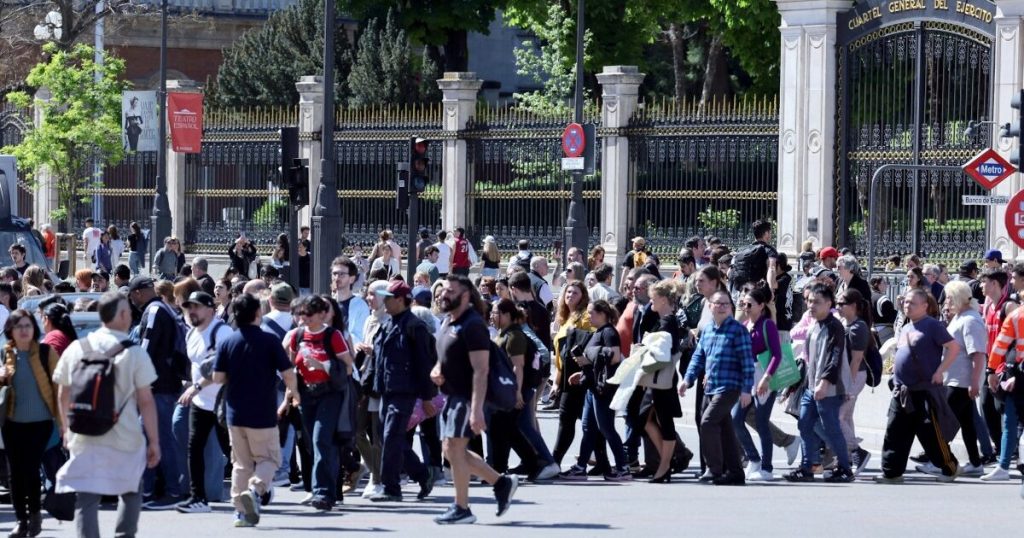The unexpected and widespread power outage that plunged Spain into darkness on Monday, April 28, 2025, unleashed a wave of panic and disruption across the nation. Millions of people found themselves abruptly disconnected from the digital world, their daily routines thrown into chaos. From bustling city centers to quiet suburban streets, the sudden absence of electricity revealed a deep reliance on technology and a vulnerability to unforeseen events. The outage triggered a cascade of problems, affecting transportation, communication, and daily life, leaving many stranded, confused, and searching for answers.
The impact of the blackout was immediately felt in the transportation sector. Subway systems ground to a halt, trapping passengers in darkened tunnels before slowly inching their way to stations. Carlos Condori, a 19-year-old construction worker, found himself among those stranded on the Madrid metro, describing the scene as one of stunned disbelief. The sudden darkness and silence were unprecedented in his experience, highlighting the rarity of such large-scale power failures in Spain. Above ground, the absence of traffic lights created gridlock and confusion. The usual rhythm of the city was replaced by a cacophony of sirens, whistles, and car horns as police struggled to manage the chaotic traffic flow. Major transportation hubs like Madrid’s Atocha train station were forced to close, leaving commuters stranded and searching for alternative ways to reach their destinations.
The digital age came to a screeching halt as the power outage severed internet connections and rendered mobile phones useless. Office workers spilled onto the streets, their computers transformed into inert slabs of plastic and metal. The inability to communicate with family and friends added to the anxiety and uncertainty. Marina Sierra, a 16-year-old student, found herself evacuated from her smoke-filled school, disoriented and struggling to contact her father. The sudden disruption to her routine and the inability to connect with her family left her feeling shocked and vulnerable. The blackout exposed the fragility of the interconnected world and the dependence on constant communication that has become ingrained in modern life.
Barcelona, Spain’s second-largest city, was also thrown into disarray. Locals and tourists alike flooded the streets, seeking information and a sense of order. Laia Montserrat, a student living an hour outside Barcelona, found herself in a predicament when the power cut short her presentation at school. With no internet access and no trains running, she and her classmates were left stranded, unsure of how to get home. Leonor Abecasis, a visitor from Portugal, experienced the blackout while shopping and expressed concern about her flight back to Lisbon later that day. The outage disrupted travel plans and created uncertainty for those far from home.
Amid the widespread panic and confusion, some individuals managed to maintain a sense of perspective. In Madrid, Pilar Lopez, a 53-year-old administrator, attempted to reassure her colleagues who were worried about the food in their freezers. Having lived through the pandemic, she viewed the power outage as a temporary inconvenience rather than a catastrophe. Lopez saw the situation as a reminder not to take modern conveniences for granted and to cultivate a greater sense of self-reliance. The inability to pay electronically reinforced her belief in the importance of maintaining some analog capabilities.
The widespread power outage in Spain served as a stark reminder of the fragility of modern infrastructure and the deep dependence on electricity that permeates every aspect of daily life. The sudden disruption exposed the vulnerability of interconnected systems and the potential for chaos when those systems fail. From transportation and communication to basic necessities like food storage, the blackout highlighted the importance of preparedness and the value of maintaining some level of self-sufficiency. While the event caused widespread inconvenience and anxiety, it also offered a moment of reflection on the role of technology in modern society and the importance of adapting to unexpected challenges. The experience underscored the need for robust infrastructure and contingency plans to mitigate the impact of future disruptions. It also served as a reminder of the resilience of the human spirit and the ability to find perspective and even humor in the face of adversity.


